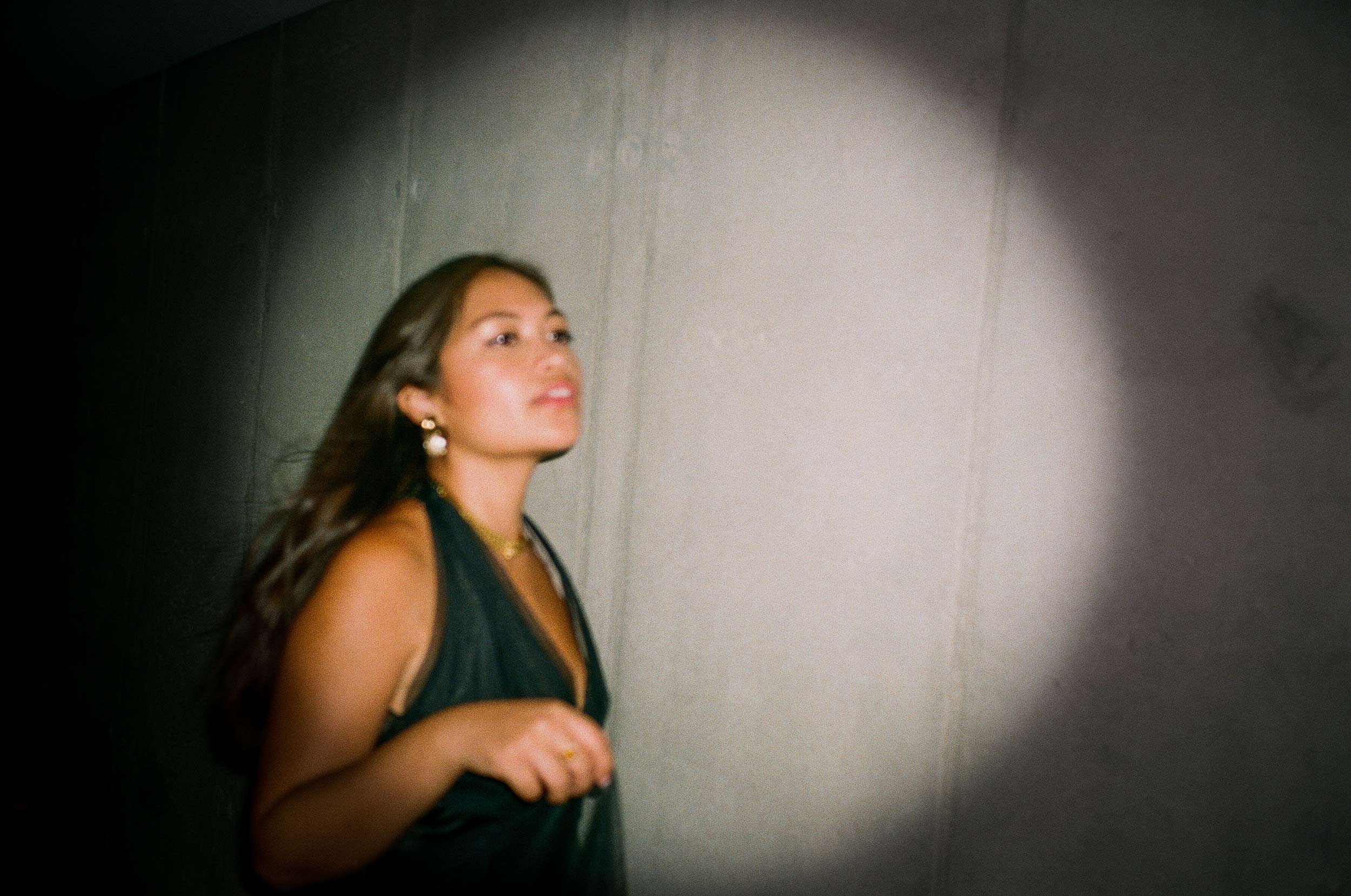In her debut novel Happy Hour, the Toronto-based writer and filmmaker reveals the latent power of hyperfemininity
To get by in New York, you need some sort of capital. If you don’t have money, you need social status. But if you’re an outsider with neither, you need to be a little mischievous and a lot charming to get both. That’s the heart of Happy Hour, the debut novel from 30-year-old Toronto writer and filmmaker Marlowe Granados.
The book follows two 21-year-olds over the course of a scorching summer in New York in the late aughts. Isa and Gala are childhood best friends sharing a bed in a cramped Bed-Stuy sublet, selling secondhand clothes at a Chinatown market stall to scrape together enough money for a bodega sandwich and cab fare home. Without a central conflict to propel the plot, Isa’s voice—effervescent, insightful, and funny—shines as the main draw. Through Isa’s diary entries, the book traces the nuances of the girls’ sisterly bond. Through her shrewd observations and sharp prose, Granados deftly explores a kind of rare platonic intimacy, where shared histories and secrets connect as much as they cut.
The pair are street-smart, stylish, and magnetic, traversing Manhattan’s art and social scenes with a hustler’s spirit and a bird’s-eye view of who’s who and what’s what—or rather, what you can get, and from who, from eccentric artists to rich men to deceitful socialites. Like any currency, social or otherwise, charm and allure can be transactional, and sometimes deals go south. But even when the girls get hurt or used, by men or each other, they’re still in control of the narrative–there’s always a scheme simmering, an escape plan being hatched. Even in the face of unforeseen circumstances, Isa and Gala prioritize their freedom and desires first—exuding what Gen Z calls “main character energy.”
Broadly, Granados’s literary preoccupations focus on the elusive power of hyperfemininity in life and art. In her recent Baffler essay, “The Bimbo’s Laugh,” she recontextualizes the bimbo—a character who is canonically dismissed as stupid and frivolous—as a sly social operator using her beauty and allure to get by and get hers. “The essence of the bimbo in cinema has always been subversive,” she writes. “If you weren’t in on the joke, you were the butt of it. The bimbo’s humor was for a feminine audience. She often made fun of men, but they rarely noticed, distracted by the aesthetic attack of the bimbo’s physicality.” With Happy Hour, Granados writes for that same audience, positioning her work within a lineage of party girls and bimbos whose mystique and magnetism are no joke.
Josh Greenblatt: What was the process of writing the book?
Marlowe Granados: I started writing it when I had just turned 22, and for me, the main starting point was Isa’s voice. Because it’s particular and it has a certain type of rhythm, I wanted to get it correct early on. I started writing a monologue for her that never made it in; it’s one of those things that screenwriters do, to explain how the person grew up, or their backstory that you don’t necessarily have to put in, but is good for you to know.
I thought about how Isa would be in social situations—how she would describe herself in that first interaction with someone. I think the whole thing with her is that she’s so much about taking control of her own narrative and her own identity, and how that can be portrayed. I started off with Isa and it kind of just built up from there.
“I wanted to think about what feminine language sounds like. How do we imagine this as a larger theme or style?”
Josh: What was the publishing process like?
Marlowe: Well, it got rejected by everyone until 2017.
Josh: Some of the most successful books do, I’ve heard.
Marlowe: Yeah, it was just an interesting experience because a lot of the criticism people had for it were kind of the reasons I wrote the novel. Like, “Nothing really happens to them, they don’t suffer, they’re fine.” Now I’m very primed for criticism, because I’ve heard it all before. And honestly, people who get the novel really get it, and I think that’s a really key thing—trying to enable the correct audience to find this novel, because a lot of those people aren’t reading literary reviews of books. I think it’s a lot of young women who usually buy a book once or twice a year, and that’s my main demographic.
Josh: I was going to ask, who was your intended audience?
Marlowe: To be honest, I wanted to write something that my friends could read, that showed who they were in an accurate way. My friends are these very feminine, very beautiful young women. We have such thoughtful conversations, and provide so much support within our friendships about going through heartbreak, or dynamics with friends, that I felt wasn’t really being accurately depicted anywhere. It’s so unfortunate because, it’s not even like these girls are trying to climb a corporate ladder or find boyfriends. It’s kind of just about living and being in an urban space and trying to survive, but in a fun way. Not too gritty, I would say.
Josh: Is hyperfemininity a sort of armor, a way for you to get through life?
Marlowe: Femininity has always been a really big theme in my work, and I wanted to also think about what feminine language sounds like. How do we imagine this as a larger theme or style, and what would that actually look like? I’ve always just been fascinated with women who were wrongly portrayed as being frivolous.
Josh: I love your piece “The Bimbo’s Laugh” in The Baffler, which touches on that idea.
Marlowe: Yeah, that [idea] has always been really big for me. I wanted to write that piece because it felt very appropriate at the time, but also it’s something I’ve always been thinking about: the way that we characterize very feminine women who possess a certain levity, and why lightness should be taken seriously. When we thought about how the novel got rejected so many times, it was really clear that people weren’t taking it seriously because of its humor and levity.
If you think about what the different toolboxes [are, that are] accessible [to women], and what they have access to in terms of rising ranks, a lot of the time it’s smarts. It’s kind of shielded, or not obviously intimidating. You want to also seem a little bit dependent. Prettiness is something I think is really interesting, because it’s so elusive. If you talk about being pretty, people are like, “Well, you’re not pretty anymore.”
Josh: You’re not allowed to acknowledge it, because it should be something other people project onto you. Like, “Beauty is in the eye of the beholder.” But if you do acknowledge your own beauty, then it’s used against you.
Marlowe: Totally. You can’t ever actually say it, because then you’re being vain or full of yourself or whatever. But it’s such a weird thing. I love talking about it; I love talking about how [prettiness] works, [how it affects] your position in the world. It’s also complicated by race and sexual orientation and class, obviously. I just think anything I ever make is going to always be focused on these particular types of women.
Someone asked me, “Why didn’t you [write anything] about the internet?” And I was like, “I think because that’s what other writers are doing. That’s fine for them to do, but that wouldn’t be my specialty, and I want to have a kind of corner that I’m an expert in.”
Josh: I think that’s what’s so cool about what you’re writing and thinking about, especially in these broader conversations about what’s “fashionable” to write about, or even who has the right to write about what. I have to ask: How much of Isa is you?
“People don’t often think that girls who are very chaotic or exuberant are also having their own whole set of observations about the world.”
Marlowe: I think it’s really important to have novels that aren’t set so far apart from the observer’s point of view, because I think that really lends itself to the artist and the muse. I’m more interested in centering the muse—in terms of actually having that be where we see the world from—and what that would look like, and how that actually works. I think being an observer in the literary tradition is so common. And also, to be honest, when you’re observing things it can so easily fall into snark, or a condescending voice that I don’t find helpful. When I talk about bimbos, the idea is to punch up, which is much more interesting than punching down. People don’t often think that girls who are very chaotic or exuberant are also having their own whole set of observations about the world, and that they are also aware of how people [perceive] them. That really comes into play in the novel.
How I live is always as a participant, and I think I’ve also been the subject of people’s observations. One time, someone wrote about me, and someone else recognized me from the piece. They sent it to me, and I was like, “Oh yeah, that is me.” But it was so terrible, because they used this version of me to snap off a line and make a point, but that doesn’t actually give that character any humanity at all. I’m just a placeholder for an idea or an archetype.
Josh: It reduces you.
Marlowe: Yeah, of course. I get how that could be a device, but that doesn’t interest me.
Josh: You’ve talked about how “charm is currency”—a powerful and persuasive quality that can’t be taught or faked. You really capture how someone can wield that to get what they want.
Marlowe: That’s always been a major theme [in my work], and I used to think about it while writing. Like, how can you put charm on the page? How can you charm your reader, which is the biggest challenge? A lot of that has to do with the way that Isa speaks—the way people feel very close to her, in a way.
“Charm is very similar to glamour—it’s elusive. You know it when you see it and experience it.”
I had to read it out loud, every single thing that I wrote, because there’s a certain cadence. This is so witchy sounding, but [the book has] a very specific rhythm and almost [feels like] a spell—[it has] a certain type of entrancing quality that I think is really important in the text. I think about charm so much. When it is in combination with beauty and glamour, you have a certain type of magnetism that people are drawn to. When you have that, naturally you go [one of] two ways: Either you try to shy away from it, or you [treat it like] a fine-tuned instrument. I’ve known people who are attractive, but the way they handle the world is based on eroticism and flirtation. I think charm is very different from that. Charm is not sexual; it’s very similar to glamour—it’s elusive. You know it when you see it and experience it, but to know the qualities of it and make it into a formula… It doesn’t work in the same way. Similarly to glamour, charm is where someone gives something away, but is also holding back. It creates this dynamic where the person wants more, but can’t ask for more, because once you talk about it, it’s very weird. It’s like, no—the spell is broken.
Josh: Acknowledging the unacknowledge-able.
Marlowe: I think it’s kind of disconcerting for very young women—like, 21—to have this very developed skill set of being charming. When you put [charm] against class and money, it can kind of manipulate those things that are often seen as very difficult to manipulate. There are weak spots [in wealth and status]. The people that are a little bit more wily and mischievous will see those weak spots immediately, and know what buttons to press.” That’s always fascinating to me. I love mischief, and I love when girls get away with things. I think it’s so funny, and the book really is a bunch of inside jokes to people who know what I’m talking about.
Josh: Class and wealth are thought of as the ultimate sources of power, at least within a patriarchal, capitalistic society. Is it fair to say that a charming young woman threatens or disarms otherwise powerful men, who want to strip that woman of her power?
Marlowe: Yeah, totally. I think a part of misogyny is based on jealousy—not being able to do the same things that young women can do. I’ve experienced that out in the world. People get mad at you for no reason. They’re automatically like, “You can get away with everything, and this is my way of putting you in your place. I already know—without knowing anything about you—[what] you think you can get [from me, and that you think you can] take advantage of me.” I think that’s a real source of stress for men.
Men hold back from Isa so much, because she’s so forthright about stuff—there’s something about that that is threatening. They’re like, “No, this is not the order of things. You can’t be in this position, acting like this… This is too much!”













